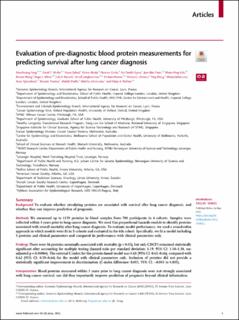Evaluation of pre-diagnostic blood protein measurements for predicting survival after lung cancer diagnosis
Feng, Xiaoshuang; Muller, David C.; Zahed, Hana; Alcala, Karine; Guida, Florence; Smith-Byrne, Karl; Yuan, Jian-Min; Koh, Woon-Puay; Wang, Renwei; Milne, Roger L.; Bassett, Julie K.; Langhammer, Arnulf; Hveem, Kristian; Stevens, Victoria L.; Wang, Ying; Johansson, Mikael; Tjønneland, Anne; Tumino, Rosario; Sheikh, Mahdi; Johansson, Mattias; Robbins, Hilary A.
Peer reviewed, Journal article
Published version
Date
2023Metadata
Show full item recordCollections
Abstract
Background
To evaluate whether circulating proteins are associated with survival after lung cancer diagnosis, and whether they can improve prediction of prognosis.
Methods
We measured up to 1159 proteins in blood samples from 708 participants in 6 cohorts. Samples were collected within 3 years prior to lung cancer diagnosis. We used Cox proportional hazards models to identify proteins associated with overall mortality after lung cancer diagnosis. To evaluate model performance, we used a round-robin approach in which models were fit in 5 cohorts and evaluated in the 6th cohort. Specifically, we fit a model including 5 proteins and clinical parameters and compared its performance with clinical parameters only.
Findings
There were 86 proteins nominally associated with mortality (p < 0.05), but only CDCP1 remained statistically significant after accounting for multiple testing (hazard ratio per standard deviation: 1.19, 95% CI: 1.10–1.30, unadjusted p = 0.00004). The external C-index for the protein-based model was 0.63 (95% CI: 0.61–0.66), compared with 0.62 (95% CI: 0.59–0.64) for the model with clinical parameters only. Inclusion of proteins did not provide a statistically significant improvement in discrimination (C-index difference: 0.015, 95% CI: −0.003 to 0.035).
Interpretation
Blood proteins measured within 3 years prior to lung cancer diagnosis were not strongly associated with lung cancer survival, nor did they importantly improve prediction of prognosis beyond clinical information.
Funding
No explicit funding for this study. Authors and data collection supported by the US National Cancer Institute (U19CA203654), INCA (France, 2019-1-TABAC-01), Cancer Research Foundation of Northern Sweden (AMP19-962), and Swedish Department of Health Ministry.

